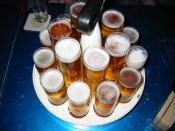As many students enter into college and pursue our goals, there is one factor that continually affects thousands of students. In their progression through academic achievement, they and their close friends could potentially experience one of the most serious phenomenons on today's college campuses. Binge drinking has spread around this country's colleges like an unforgiving epidemic; its damaging effects are increasingly become problematic.
"Binge" drinking is defined for men as drinking five or more drinks in a row, and for women as drinking four or more drinks in a row. Overall, 44 percent of the students surveyed by a recent Harvard study were binge drinkers. Among men, 50 percent were binge drinkers; among women the figure was 39 percent. These high percentages instill the influence that alcohol has on many students.
Many factors contribute to binge drinking. Coming to college is always a new experience; it's similar to Alice's journey down the rabbit hole.
As students arrive, they are subjected to new people and new environments. Above all, many students experience the freedom from parental controls and allow their own consciences to control their actions. Due to this new found freedom, many students feel it necessary to venture into new experiences such as drinking. There is the perception that when young people go off to college they think that "everybody" is drinking and bingeing, they are more likely to drink and to binge in order to conform. There are many instances in which a desire to fit in forces the mind into performing unwanted tasks, such as playing drinking games which lead to profuse drinking. These absent-minded people don't evaluate their decisions very well. The positive reaction of downing six or seven beers makes them feel "cool"� and accepted. In addition, the need to feel accepted will ultimately shape the person's mind forever and could prove disastrous. Above all, many individuals that suffer from binge drinking have very little self control and allow themselves to be controlled by such insignificant factors as popularity.
Unfortunately, drinking is actually promoted by a sector of Gonzaga's student body. This is an important issue, for its one of the main causes of drinking at our school. Many colleges have privately funded organizations that include drinking in their activities. "The Kennel Club"� was organized as a campus marketing scheme. The club has pre and post game parties with unlimited supplies of beer. For the small cover cost of $25, a student can drink as much as they can consume. The sponsorship of these clubs sends messages to many students and provides the alcohol necessary for bingeing.
Binge drinking has overwhelming consequences and its effects are felt by all aspects of society, especially by those who drink. Unfortunately, it's a daily occurrence to hear an accident or tragedy involving a drunken individual. According to a study conducted by the Harvard School of Public Health, frequent binge drinkers were seven to 16 times more likely than non-binge drinkers to have missed class, gotten behind in their school work, engaged in unplanned sexual activity, not used protection when having sex, gotten in trouble with campus police, damaged property, or been hurt or injured. These are only a fraction of the potential effects of alcohol abuse. Colleges all across the country are facing this phenomenon. This problem not only interferes with this institution's mission and goals but it also creates many risks, such as injury, disease, and even death.
The most crucial element in solving the problem of binge drinking is to influence students and attempt to promote positive alternatives to drinking. Emphasizing education on alcohol abuse is widely used, though with minimal results. Regardless of how much we try to influence students; there will always be alcohol and those that seek its enthrallment. However, efforts in relieving the issue must be kept constant. However, as the consequences of alcohol abuse are continually felt by the public, there will be greater concern for the sake of our students and their families. School should also adopt better methods of controlling alcohol abuse and create a positive environment for its students. Despite everything, it's the drinkers themselves that hold the ultimate control over their actions. If they can become responsible drinkers, great steps can be reached in reducing alcohol related problems in our colleges.





